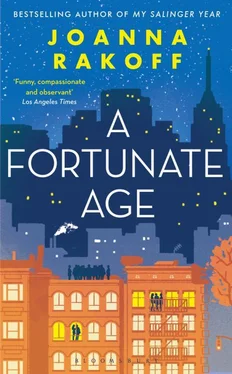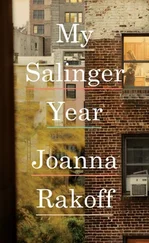Not surprisingly, Delores—who wore her cedre hair in an archaic puff and covered her watery green eyes with saucer-sized lenses of 1970s vintage—was unhappy with her new digs, despite having successfully dismantled the smoke alarm in her office with a mother-of-pearl-handled letter opener, and converted one of her stainless steel file drawers into a makeshift bar. Over the four years of Sadie’s employment, Delores began coming into work later and later, swaddled in her enormous whiskey mink, and departing earlier and earlier.
In Sadie’s first year, when she’d still been a little nervous around the lady, Delores had greedily insisted on reading most of the submitted manuscripts herself, staying home Fridays to do so, like many editors, and, though she no longer did any serious editing of the few books she took on (“What’s the point? It’s all crap”), she refused to allow Sadie to try her hand at it. But gradually, the tide had turned, so that now Sadie not only did all the reading and editing (drafting letters to authors, in which she outlined changes, which Delores merely signed without so much as glancing at them), but also handled most of the purchasing of manuscripts. It worked like this: A manuscript came in from an agent. Sadie unwrapped it and placed it on Delores’s desk. An hour or a day later the manuscript turned up on Sadie’s desk, a Post-it note stuck to its top, saying “Looks interesting. Pls. read” in Delores’s slanting scrawl. Sadie read the thing—sometimes that night, sometimes weeks later, depending on the urgency surrounding the manuscript in question—and wrote up a report for Delores, leaving manuscript and report on the woman’s desk. An hour or a day later, the thing, once again, landed back on Sadie’s desk, with another Post-it, saying either “I agree. Terrible. Pls. call Liza and say ‘pass.’” or “Yes!!!! Spend up to 50K. Tlk. to Val if nd. more.” Sadie would then call the agent, make an offer, and complete the negotiations. Once the book was bought, it was she who went through it, line by line, and it was she who asked the writers in for coffee or lunch, passing off her edits as Delores’s own.
The authors, Sadie suspected, understood exactly what was going on. And so, she thought, did the other editors. Every year she received a decent raise and Val often stopped her in the hallway and said, “Hey, great work on such and such.” And now, of course, there was this business with Tuck’s book and her allegedly imminent promotion, which Delores hopefully wouldn’t sabotage in order to keep Sadie permanently installed in her outer office. Delores was prone to fits—temper tantrums of tornadolike proportions—during which she picked on Sadie’s every alleged mistake: the time Sadie accidentally sent a manuscript back to the wrong agent or the time she had the flu and didn’t read a particular novel in time for Delores to bid on it, and the book—wouldn’t you know?—stayed on the bestseller list for two years.
Thus, in the weeks before her promotion was announced—before she at last moved her things quietly out of Delores’s court and trained some poor new girl to take her place—she vowed to avoid even the tiniest error. She would read every manuscript carefully and quickly, as soon as they came in, just in case Delores snapped back to life.
And so it was, that the Sunday after Lil’s party Sadie woke filled with determination. This particular Sunday—of all Sundays—she would simply run uptown, say hello, grab a bagel, and head back home to read. She would tell Tal that he could come over late or the following day, though she’d been aching for him since the previous night, after he’d run off with Dave without even kissing her good-bye. She’d have an hour on the train, each way, which would be good reading time, and then most of the afternoon and evening ( No PBS , she told herself sternly). She would not fall prey to her mother’s protestations—“Sadie, you haven’t seen my new tablecloth!” “Sadie, tell me what you think about this dress,” “Sadie, I don’t want any leftovers, eat another chub”—nor would she drink any wine, even if her cousin Bruce brought something nice. She was tired enough from the party, or, really, from dinner with Beth. They’d talked for hours, parting with a long hug and a promise to do the same again soon, and Sadie had left convinced that Will Chase was all right, that she would love him, as Beth did. She hated that Beth had felt Sadie needed convincing. Why had she said all that about Will months back? Beth would always think Sadie skeptical of her marriage.
And she would , she thought, lying in bed, willing herself to get up and into the shower, she would give him a chance, so as not to let some strange distance develop between herself and Beth, as it had between her and Lil—though they wouldn’t admit it—because she had never quite warmed to Tuck, though there was, of course, still time. Then, like a shot, her head cleared and the party unfolded before her. Tuck . Why should she warm to Tuck when he had spent a whole evening—a party thrown for him by his wife, to celebrate his success, which Sadie herself had orchestrated—hidden away in his own bedroom with Caitlin Green, of all people. Was Tuck having an affair with Caitlin Green? No, it didn’t seem possible. Caitlin was just so awful. No. No. People just didn’t do things like that anymore. They were too busy checking their email or what have you. She glanced at the clock. Nine o’clock. If she got out of the house in half an hour, she’d have time to walk by that optician’s shop at Eighty-first and Lex and see if it was open for a couple of hours on Sunday, like it used to be. The ache behind her eyes was worse.
Just then the phone rang, and Sadie, without thinking, answered, expecting to hear Tal’s voice, or perhaps her mother’s, on the line. She found, instead, Caitlin Green. “Sadie?” she said, in an odd, muffled voice. “I need you to come meet me this morning.”
Oh, you do , thought Sadie. “Um, I’m afraid I have plans this morning,” she said, tucking the phone between her shoulder and her ear, and padding to the kitchen. And you’re the last person I’d break them for .
“Look, we need to talk,” insisted Caitlin, in tones verging on a whine.
“About what?” said Sadie, with a dismayed sigh. If Caitlin was calling her, then nothing good could have happened in that bedroom the previous night.
“You know ,” said Caitlin. “Listen, I only have a minute. Rob just went to get the paper. Could you come over this morning?”
Sadie quickly calculated that she could leave her parents by one-ish, spend an hour with Caitlin—an hour with Caitlin!—and be home by three-thirty. But maybe it would be better to just get it out of the way, then try to make it up to her parents for the end of breakfast.
“Fine,” she said, sighing. “I’ll meet you at Oznot’s in an hour.”
“No,” said Caitlin. No? thought Sadie. I’m doing what you want! “Just come here. I don’t want anyone to hear us talking.”
“Fine,” said Sadie, and scribbled down the address in her planner. With dread, she called her parents and told them—they were quite put out—that she’d probably have to miss breakfast. An hour later, she pushed open the door to Caitlin’s building, a lobby-less tenement, its floor and stairs covered in split linoleum, patterned to resemble bricks and mortar, curling away at the walls’ edges. The air inside this little passageway smelled of oil and cabbage. Sadie, sweat pricking at her underarms, began a slow ascent to the fourth floor.
With much clanking and clacking of locks, Caitlin opened the metal door to the apartment and propped it with her foot. A large black dog with a diamond-shaped head and small piggy eyes snuffled asthmatically at her bare feet, its muscular tail thwacking loudly on some unseen object. Caitlin’s toenails were painted a flat metallic blue, the polish flaking slightly at the rims. Such colors—blue, green, smoke gray—were popular that year, but Sadie thought they looked like mold. “Hi,” Caitlin said. “Come in. Do you want a cup of coffee? I’m just making some.” Sadie squeezed past Caitlin, stepping awkwardly over the hound and into the apartment. “Sure,” said Sadie, looking around her, as Caitlin repeated the loud rigmarole with the locks and chains.
Читать дальше












